FOR THE Western Bulldogs to progress to the next stage of the finals, there's one plan that must be perfectly executed.
Operation stop Nick Haynes.
Before suffering a fractured larynx, Haynes was arguably Greater Western Sydney's most influential player in the round 22 clash against the Dogs.
Haynes spent a portion of the second half of the on the bench after an incident with Marcus Bontempelli, but returned to the field to see out the game.
Nick Haynes is set to miss multiple weeks with a fractured larynx after this clash with Marcus Bontempelli.
— AFL.com.au (@AFLcomau) August 20, 2019
The Bont was offered a $2000 fine by the MRO yesterday. Details: https://t.co/0cRoMGwAAp pic.twitter.com/4TAqBKaVXG
Bulldogs coach Luke Beveridge isn't one to change a gameplan based on one individual, but that may change for the upcoming elimination final at Giants Stadium if Haynes gets the all clear to play.
"The respect and admiration I have for Nick Haynes, I think he's almost the best intercept, courageous defender in the competition," Beveridge said in the week after the round 22 clash against Greater Western Sydney.
"Even last week I called our players in, we were doing some scenario-based training. I said to our forwards what we asked you to do there, we didn't quite get right, and if we don't get it right, Nick Haynes is going to intercept everything."
Haynes knows exactly what the Bulldogs want to do, with his judgement being on full show in round 22.
Beveridge is right to respect Haynes. The defender has averaged 20.8 disposals and 3.8 intercept marks in his last five matches against the Bulldogs.
For reference, Haynes' teammate Phil Davis leads the League with 3.9 intercept marks per game in 2019.
So what exactly does Beveridge mean by getting it 'right'?
It's all about how the Bulldogs decide to kick the ball inside 50. How high, how deep and who the ball goes to are all important factors.
Davis and Haynes took a combined nine intercept marks against the Dogs in round 22, with five of those being taken inside the defensive 50 for the Giants.
All five of those were taken in the first half of the game.
That's exactly why the Dogs must make sure the ball is kicked nowhere near him in the elimination final.
In contrast, the Dogs took 14 marks inside 50 for the game, but only six of those came in the first half.
First half | Second half | |
Marks taken by Bulldogs in F50 | Six | Eight |
Intercept marks taken by Davis in D50 | Three | Zero |
Intercept marks taken by Haynes in D50 | Two | Zero |
The strategy behind the ball movement wasn't working, with Davis dominating in the air.
The Bulldogs took eight marks inside 50 in the second half, while neither Davis nor Haynes took an intercept mark in the defensive 50 in that time.
The kicks were kept low and direct to the leading mid-sized forwards. The forward 50 entries were shallow, often ending up 40 metres away from goal.
And if a high ball did come in, the first priority was to halve the contest and make sure the ball got to ground.
The placement of those shallow entries has been a success for the Dogs over the last six weeks of the season.
Bailey Dale has kicked 20 goals since his return in round 18. Tory Dickson, Sam Lloyd and Josh Schache have combined for 30 goals in that time frame too.
Beveridge has been asked what's different between his current team and the side that won the premiership in 2016 and he's been consistent in his messaging – the 2019 side is far better offensively.
In the past six weeks, the Dogs have kicked a massive 666 points. The next closest side are the Eagles with 550 points.
The ball movement is the envy of the competition, and if the Dogs can follow through on 'operation stop Haynes', then there's no reason why this team shouldn't progress to the semi-finals.




